Our Summary
This research paper is about predicting the risk of a disease called secondary hyperparathyroidism coming back after surgery to remove the parathyroid glands.
The researchers collected data from 168 patients who had this surgery between June 2017 and May 2019. They used this information to build a model that could predict the likelihood of the disease returning. This model considered a variety of factors, including the type of dialysis method used, the location of the parathyroid gland, hormone levels after surgery, the number of glands removed, and the level of phosphorus in the blood after surgery.
To test this model, the researchers used data from 158 patients who had the same surgery between June 2019 and September 2021. They found that the model was highly accurate in predicting the recurrence of the disease.
In conclusion, this model could be useful in predicting individual risks of disease recurrence after surgery for secondary hyperparathyroidism. This could help doctors to provide personalized care for their patients.
FAQs
- What is the purpose of the model developed by the researchers in this study?
- What factors does the model consider in predicting the likelihood of secondary hyperparathyroidism returning after surgery?
- How accurate was the model in predicting the recurrence of the disease in the test group of patients?
Doctor’s Tip
One helpful tip a doctor might tell a patient about parathyroidectomy is to follow up regularly with blood tests to monitor hormone levels and ensure that the surgery was successful in regulating calcium levels in the body. It is also important to maintain a healthy diet and lifestyle to support overall bone health and prevent the recurrence of hyperparathyroidism. Additionally, communicating any symptoms or concerns with your healthcare provider promptly can help in early detection and management of any potential issues.
Suitable For
Patients who are typically recommended for parathyroidectomy are those with secondary hyperparathyroidism who have not responded to other treatment options such as medication or dietary changes. These patients may have symptoms such as bone pain, fractures, kidney stones, or high levels of calcium in the blood. Additionally, patients with severe hyperparathyroidism, high levels of parathyroid hormone, or significant bone loss may also be candidates for parathyroidectomy. Ultimately, the decision to recommend parathyroidectomy will depend on the individual patient’s medical history, symptoms, and response to other treatments.
Timeline
Before parathyroidectomy:
- Patient may experience symptoms of hyperparathyroidism, such as fatigue, weakness, bone pain, kidney stones, and frequent urination.
- Patient undergoes diagnostic tests, such as blood tests and imaging studies, to confirm the diagnosis of hyperparathyroidism.
- Patient consults with an endocrinologist or surgeon to discuss the option of surgery to remove the parathyroid glands.
- Patient undergoes pre-operative evaluation and preparation for surgery.
After parathyroidectomy:
- Patient undergoes surgery to remove the parathyroid glands.
- Patient may stay in the hospital for a day or two for monitoring and recovery.
- Patient may experience temporary symptoms such as hoarseness, difficulty swallowing, or low calcium levels, which are usually managed with medication.
- Patient follows up with their healthcare provider for post-operative care and monitoring of hormone levels.
- Patient may experience improvement in symptoms of hyperparathyroidism, such as increased energy levels, improved bone health, and reduced risk of complications like kidney stones.
What to Ask Your Doctor
What is secondary hyperparathyroidism and why do I need a parathyroidectomy?
What are the potential risks and complications associated with parathyroidectomy surgery?
How long will it take to recover from the surgery and when can I expect to return to normal activities?
Will I need to take any medications or follow a specific diet after the surgery?
How will you determine if the surgery was successful in removing the diseased parathyroid glands?
What is the likelihood of the disease coming back after surgery and what factors can affect this?
Will I need to undergo any follow-up tests or appointments to monitor my condition after the surgery?
Are there any lifestyle changes I should consider to help prevent the disease from recurring?
Are there any alternative treatments or therapies available for secondary hyperparathyroidism?
Can you explain the findings of the research paper on predicting the risk of disease recurrence after parathyroidectomy and how it may apply to my individual case?
Reference
Authors: Han Y, Wang C. Journal: Lin Chuang Er Bi Yan Hou Tou Jing Wai Ke Za Zhi. 2023 Apr;37(4):282-287. doi: 10.13201/j.issn.2096-7993.2023.04.009. PMID: 36987959
